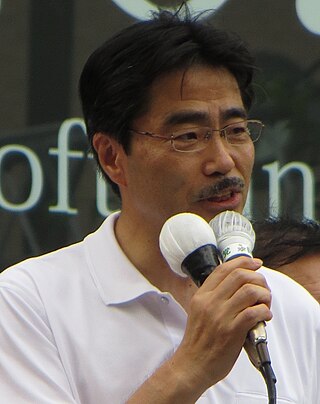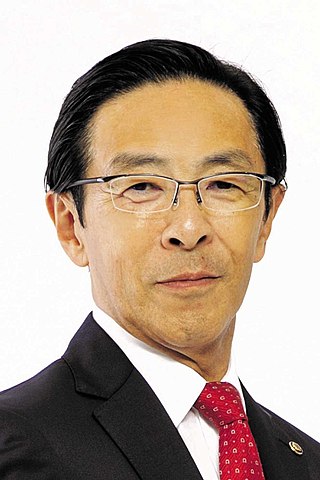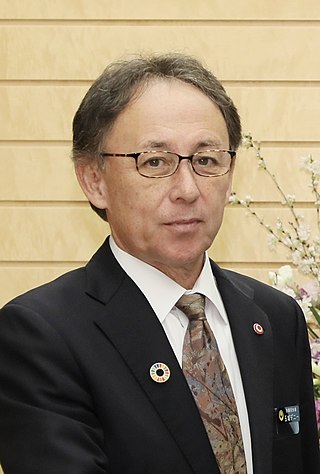
Zenkō Suzuki was a Japanese politician who served as prime minister of Japan from 1980 to 1982.

Ichirō Ozawa is a Japanese politician and has been a member of the House of Representatives since 1969, representing the Iwate 3rd district. He is often dubbed the "Shadow Shōgun" due to his back-room influence.

The Japanese political process has two types of elections.

The Tokyo Metropolitan Government is the government of the Tokyo Metropolis. One of the 47 prefectures of Japan, the government consists of a popularly elected governor and assembly. The headquarters building is located in the ward of Shinjuku. The metropolitan government administers the special wards, cities, towns and villages that constitute part of the Tokyo Metropolis. With a population closing in on 14 million living within its boundaries, and many more commuting from neighbouring prefectures, the metropolitan government wields significant political power within Japan.

Hiroya Masuda is a Japanese politician, government official, and business executive. He was Minister of Internal Affairs and Communications from August 2007 to September 2008, and has served as the president and CEO of Japan Post Holdings since January 2020.
This article lists events in 2011 in Japan.
The 17th unified local elections in Japan took place in April 2011. In the first phase on April 10, 2011, 12 governors, 41 prefectural assemblies as well as five mayors and 15 assemblies in cities designated by government ordinance were elected. In the second phase on April 24, 2011, mayors and assemblies in hundreds of cities, "special wards" of Tokyo, towns, and villages were up for election. Additionally, a by-election for the National Diet was held in Aichi on April 24.
The 16th unified local elections in Japan took place in April 2007. In the first phase on April 8, 2007 13 governors, 44 prefectural assemblies as well as four mayors and 15 assemblies in cities designated by government ordinance were elected. In the second phase on April 22, 2007 mayors and/or assemblies in hundreds of cities, special wards, towns and villages were up for election. Additionally, by-elections for the national Diet were held in Fukushima and Okinawa on April 22.
Events in the year 2012 in Japan.
The first stage of the 18th unified local elections in Japan took place on April 12, 2015. The Liberal Democratic Party under leadership of Shinzo Abe was the overall victor, winning many races including all ten gubernatorial races and 1,153 of the 2,284 assembly seats at stake. Further elections for municipal mayors and assemblies took place on April 26.

The Niigata at-large district is a constituency that represents Niigata Prefecture in the House of Councillors in the Diet of Japan. Since July 2019, it has two Councillors in the 242-member house, a decrease from its previous contingent of 3. Similar to other rural two seat districts in Northern Japan such as the Iwate at-large district, it often shows a willingness to buck the LDP and instead vote for opposition backed candidates, such as in 2019. Nonetheless, the LDP won the district by six points in the 2022 elections, and Uchikoshi only won by a margin of four points.

The 2016 Tokyo gubernatorial election took place on 31 July 2016 to elect the successor to Governor Yoichi Masuzoe, who submitted his resignation to the Tokyo Metropolitan Assembly on 15 June 2016. By-elections in four of Tokyo's cities were held on the same day to fill vacancies in the Assembly.

A by-election for the Tokyo 10th district in the Japanese Japanese House of Representatives was held on 23 October 2016 to replace Yuriko Koike, who vacated the seat to contest the Tokyo gubernatorial election in July 2016. Koike, a member of the Liberal Democratic Party (LDP), had represented the district since the December 2012 general election and also served a previous term from 2005 to 2009. The election was won by LDP candidate Masaru Wakasa, an incumbent member for the Tokyo proportional representation block who had supported Koike during her gubernatorial campaign. A separate by-election for the Fukuoka 6th district was held on the same day.

Takatoshi Nishiwaki is a Japanese politician and the current Governor of Kyoto Prefecture.

Hideyo Hanazumi is a Japanese politician serving as the Governor of Niigata Prefecture, following his election in June 2018. Prior to his election, Hanazumi served as a vice commandant in the Japan Coast Guard and as Vice Governor of Niigata.
The 2019 Yamanashi gubernatorial election was held on 27 January 2019 to elect the next governor of Yamanashi.
A gubernatorial election was held on 7 April 2019 to elect the next governor of Fukuoka.
A gubernatorial election was held on 2 June 2019 to elect the next governor of Aomori.

The 2022 Okinawa gubernatorial election was held on 11 September 2022 to elect the next governor of Okinawa. In the election, incumbent Governor Denny Tamaki who was backed by the Constitutional Democratic Party of Japan and some smaller parties ran against Atsushi Sakima who was supported by the Liberal Democratic Party and Komeito. Mikio Shimoji ran against both candidates as a third option. The potential relocation of the Naval Base Okinawa was, again, an important topic in the debate. Over 70% of voters in Okinawa opposed the relocation in the 2019 Okinawan referendum. Tamaki supported the complete removal of the base, while Sakima supported relocating it. Denny Tamaki won with 51.7% of the vote against Sakima and Mikio Shimoji.












